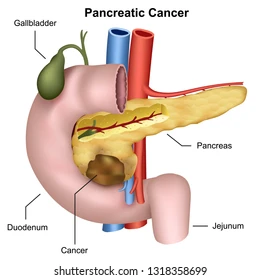Why Pancreatic Cancer is diagnosed at a later stage?
Why is Pancreatic Cancer Often Diagnosed Late?
Navigating the complex world of medical diagnoses can be challenging, particularly when it comes to the tricky nature of pancreatic cancer. This post will aim to shed light on the reasons behind the often late-stage diagnosis of pancreatic cancer and discuss if and how early detection may be possible.
At the heart of the matter is the anatomy of the pancreas itself. The pancreas is nestled deep within our body, right beside our spinal cord, in a location known as the retroperitoneum. Here, it is tucked away with other organs like the kidneys and urinary organs.
One peculiarity of this area is its relative lack of nerve supply. As a result, diseases in this region, including pancreatic cancer, don’t typically cause pain in the early stages. Pain or discomfort usually surfaces at a later stage or when nearby organs are involved, leading to the delayed diagnosis.
Symptoms of Pancreatic Cancer: The Subtle Tell-Tale Signs
Even when symptoms do appear, they can be quite subtle or even misleading. For instance, one common symptom of pancreatic cancer is jaundice, which occurs when the growing tumor begins to interfere with the bile duct’s functioning.
However, the onset of jaundice can be a slow process, taking weeks or even months to become apparent. It’s only when patients notice a yellowing of their eyes and skin that they realize something might be wrong.
Another symptom is a loss of appetite, which can be easily misattributed to other less severe conditions. Sometimes, patients also experience upper abdominal pain, but this symptom is often dismissed or mistaken for other digestive issues.
If you’ve endured symptoms like prolonged jaundice, appetite loss, or persistent upper abdominal pain for over two weeks, it’s advisable to seek consultation with a gastroenterologist.
Dr. Aditya Kulkarni at Oasis Clinic, renowned as the best gastrosurgeon in Pune, is here to provide expert care and address your concerns. Your well-being is our priority.

The Challenge of Early Diagnosis
Given its location and the subtlety of its symptoms, Pancreatic Cancer‘s early detection remains challenging. However, that doesn’t mean it’s impossible. Early detection is primarily reliant on keen awareness of bodily changes and prompt medical consultation when persistent symptoms appear.
Remember, knowledge is power. Understanding the idiosyncrasies of pancreatic cancer can arm us with the ability to recognize potential warning signs, which can lead to an earlier diagnosis and more effective treatment options.
As medical advancements advance in the pursuit of reliable early detection, proactive health measures remain paramount. Regular check-ups, a balanced diet, a healthy lifestyle, and attentiveness to bodily cues all bolster not only pancreatic cancer outcomes but also overall well-being.
Trust in Dr. Aditya Kulkarni at Oasis Clinic, renowned as the best gastrosurgeon in Pune, for comprehensive care and guidance. Your health is our priority.
Exploring the Treatment Landscape for Pancreatic Cancer
There are several treatment modalities available for pancreatic cancer, each tailored to the individual patient’s specific disease characteristics and overall health. The primary goal of these treatments is to remove the cancer, halt its progression, relieve symptoms, and improve the patient’s quality of life.
Surgery
Surgical intervention remains the only potentially curative treatment for pancreatic cancer. There are various types of surgeries, including the Whipple procedure (pancreaticoduodenectomy), distal pancreatectomy, and total pancreatectomy. The choice of surgery depends on the location and stage of the cancer.

Radiation Therapy
Radiation therapy uses high-energy beams, like X-rays, to kill cancer cells. It can be used before surgery to shrink the tumor, after surgery to kill any remaining cancer cells, or in advanced cases to relieve symptoms.
Chemotherapy
Chemotherapy is a systemic treatment that uses drugs to kill cancer cells throughout the body. It can be used as the main treatment for cancers that have spread beyond the pancreas or following surgery to kill any remaining cancer cells.
Targeted Therapy
Targeted therapy uses drugs designed to attack specific types of cancer cells, interfering with their growth and progression. This approach can be more effective and less harmful to normal cells compared to conventional chemotherapy.
Immunotherapy
Immunotherapy harnesses the power of the body’s immune system to fight cancer. While its role in treating pancreatic cancer is still under investigation, some patients may be eligible to receive immunotherapy as part of clinical trials.
Palliative Care
For advanced pancreatic cancer, palliative care can help manage symptoms and side effects. It is designed to improve the quality of life for patients and their families.
It’s important to remember that each patient’s treatment plan is individualized, taking into account the stage of cancer, the patient’s overall health, and their personal preferences.
Always discuss the benefits and risks of each treatment option with your healthcare team to make an informed decision.
- Dark urine
- Stools that are greasy or unusually light in color
- Itchy skin
- Blood clots
- Fatigue
If your body is sending these signals, don’t ignore them. Reach out to your healthcare provider to discuss what you’re experiencing.
Wrapping up
We hope this detailed guide has offered you much needed information and answered all your questions. Remember, it’s all about understanding your symptoms in early stage. If you are able to do so, the treatment becomes more effective.
In case you have any more queries, feel free to reach out to our experts. We are always here to assist.

Dr. Aditya Kulkarni
MS, DNB, FRCS, MCh (Surgical Gastroenterology & GI Oncology)
Dr. Aditya Kulkarni is a Consultant of Laparoscopic and Robotic Gastrointestinal, Hepato-biliary-pancreatic, and Cancer Surgeon at the Renowned Oasis Surgery Clinic Pune.
Book An Appointment
